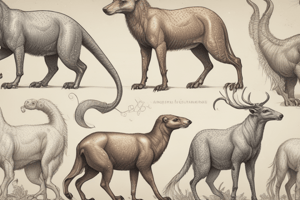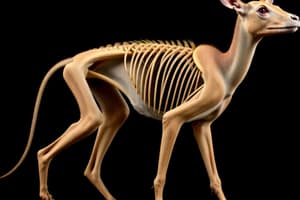Podcast
Questions and Answers
What is the classification of mammals?
What is the classification of mammals?
- Class Mammalia (correct)
- Kingdom Animalia (correct)
- Phylum Chordata (correct)
- Subphylum Vertebrata (correct)
Mammals are warm-blooded or ____.
Mammals are warm-blooded or ____.
endothermic
What is a disadvantage to endothermy?
What is a disadvantage to endothermy?
constantly eating
What is an advantage to endothermy?
What is an advantage to endothermy?
What are adaptations of warm-blooded animals?
What are adaptations of warm-blooded animals?
To maintain the high metabolic rate necessary for endothermy, a mammal must eat ____ times as much as an ectothermic animal of the same size.
To maintain the high metabolic rate necessary for endothermy, a mammal must eat ____ times as much as an ectothermic animal of the same size.
Because they are endothermic, mammals can be ____.
Because they are endothermic, mammals can be ____.
Mammals have a diaphragm which ____.
Mammals have a diaphragm which ____.
What are the 3 purposes of body hair for a mammal?
What are the 3 purposes of body hair for a mammal?
What is body hair made of?
What is body hair made of?
How many chambers in their heart do mammals have?
How many chambers in their heart do mammals have?
A 4 chambered heart allows for ____.
A 4 chambered heart allows for ____.
Pathway of blood through the heart and body of a mammal?
Pathway of blood through the heart and body of a mammal?
Mammals nurse young with the milk from ____.
Mammals nurse young with the milk from ____.
What does oviparous mean?
What does oviparous mean?
What does viviparous mean?
What does viviparous mean?
Mammals have large, well developed ____.
Mammals have large, well developed ____.
What does the cerebral cortex control?
What does the cerebral cortex control?
What does the cerebellum control?
What does the cerebellum control?
Mammals have a single lower jaw called the ____.
Mammals have a single lower jaw called the ____.
What is the function of incisors and what animals are they important in?
What is the function of incisors and what animals are they important in?
What is the function of canines and what animals are they important in?
What is the function of canines and what animals are they important in?
What is the function of premolars?
What is the function of premolars?
What is the function of molars?
What is the function of molars?
Class Mammalia is divided into ____ major groups based on ____.
Class Mammalia is divided into ____ major groups based on ____.
Name the three groups of mammals.
Name the three groups of mammals.
Monotremes example and description.
Monotremes example and description.
Marsupial examples and description.
Marsupial examples and description.
For placentals, the young develop inside a sac-like organ called the ____.
For placentals, the young develop inside a sac-like organ called the ____.
What does the placenta do?
What does the placenta do?
Placental mammals are ____ at birth.
Placental mammals are ____ at birth.
Gestation is the ____.
Gestation is the ____.
Examples of gestation:
Examples of gestation:
Placental mammals are classified according to the ____ that help the animals live in their environment.
Placental mammals are classified according to the ____ that help the animals live in their environment.
There are ____ orders of placental mammals.
There are ____ orders of placental mammals.
Name the orders of class Mammalia in group Placentals that we learned.
Name the orders of class Mammalia in group Placentals that we learned.
Order Chiroptera are capable of ____.
Order Chiroptera are capable of ____.
Animals in order Chiroptera use ____ to hunt.
Animals in order Chiroptera use ____ to hunt.
Example of an animal in order Chiroptera.
Example of an animal in order Chiroptera.
Which order is the largest in Class Mammalia?
Which order is the largest in Class Mammalia?
Adaptations in Order Rodentia.
Adaptations in Order Rodentia.
Flashcards are hidden until you start studying
Study Notes
Classification of Mammals
- Kingdom: Animalia, Phylum: Chordata, Subphylum: Vertebrata, Class: Mammalia
- Mammals are classified based on how their young develop into three major groups: Monotremes, Marsupials, and Placentals.
Characteristics of Mammals
- Mammals are warm-blooded (endothermic), maintaining a constant internal body temperature.
- Endothermy allows mammals to be active both day and night.
- Disadvantage includes the need for frequent feeding; they must consume ten times more food than ectothermic animals of the same size.
- Adaptations include a four-chambered heart and body hair made of keratin, serving three main purposes: insulation, protection, and sensory functions.
- Mammals possess a diaphragm which aids in ventilation by increasing oxygen intake.
Anatomy of the Heart
- Mammals have a four-chambered heart, ensuring complete separation of oxygenated and deoxygenated blood.
- The blood circulates through a defined pathway: right atrium, right ventricle, pulmonary artery, lungs, pulmonary vein, left atrium, left ventricle, aorta, arteries, capillaries (gas exchange), veins, vena cava, back to the right atrium.
Reproductive Traits
- Mammary glands produce milk to nourish young.
- Oviparous mammals, such as the platypus, lay eggs, while viviparous mammals give birth to live young.
- Gestation varies significantly across species; for example, rats have a two-week gestation period, while elephants have one of 1.5 years.
- The placenta provides nourishment and removes waste for developing young in placentals.
Adaptations and Brain Development
- Mammals are characterized by a well-developed brain, particularly the cerebral cortex (memory, thought, creativity) and cerebellum (senses, balance).
- Mammals possess a singular lower jaw, known as the mandible, aiding in food processing and consumption.
Dental Adaptations
- Different types of teeth serve specific functions:
- Incisors cut and tear food, critical in herbivores like beavers and rabbits.
- Canines impale and puncture, prominent in carnivores such as dogs.
- Premolars and molars are designed for chewing and grinding.
Groups of Mammals
- Monotremes: Egg-laying mammals (e.g., platypus, echidna).
- Marsupials: Young develop in a pouch post-birth (e.g., kangaroo, possum, koalas).
- Placentals: Young are born fully developed after an extended gestation period, with 18 classified orders including Chiroptera (bats) and Rodentia (rodents, the largest order).
Orders of Mammals
- Order Chiroptera: Capable of powered flight and utilize echolocation for hunting.
- Order Rodentia: Adapted for gnawing with large incisors, encompassing a wide variety of species.
Conclusion
- The class Mammalia exhibits a diverse range of life forms with complex adaptations that facilitate survival in various environments.
Studying That Suits You
Use AI to generate personalized quizzes and flashcards to suit your learning preferences.




